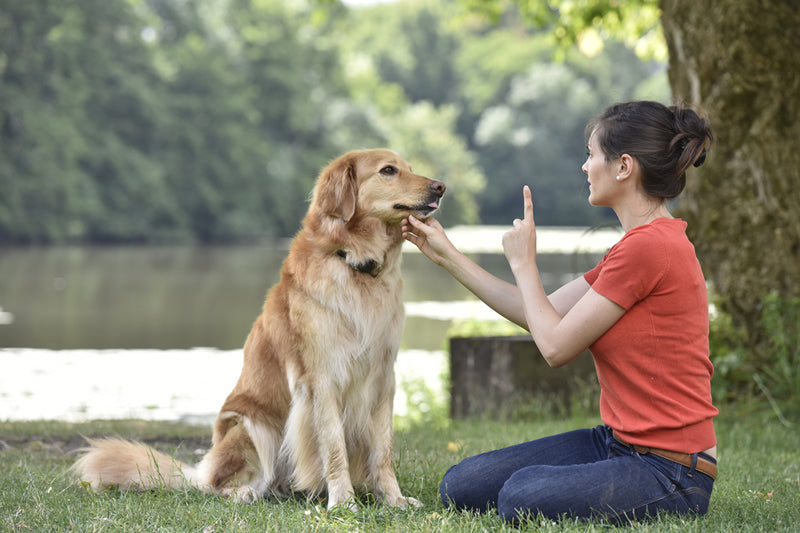
Dog Training Tips for Aggression: How to Calm Fido's Fury
Share
Dealing with an aggressive dog can be challenging and even frightening. However, with the right approach and dedication, aggression in dogs can be managed and significantly reduced. As a health-conscious pet owner, it's essential to understand that aggression stems from various factors, including fear, anxiety, or territorial behavior. In this guide, we will explore effective dog training tips for aggression to help you cultivate a peaceful and safe environment for your beloved pet.
Dog training tips for aggression are crucial for any pet owner looking to maintain a harmonious relationship with their furry friend. Whether your dog displays aggression towards other dogs, strangers, or even family members, addressing these behaviors early on is vital. By taking proactive steps, you can transform your pet's behavior and ensure their well-being.

Understanding the Root Causes of Aggression
Before diving into specific training techniques, it's important to identify the root causes of your dog's aggression. Aggression can arise from various sources, such as past trauma, lack of socialization, or medical issues. As a responsible pet owner, observe your dog's behavior closely and consult a veterinarian if you suspect any health-related triggers.
In some cases, fear-based aggression may stem from negative experiences during the puppy stage. For more insights on early socialization, you can refer to external resources such as the PetMD guide on puppy training.
Implementing Positive Reinforcement Techniques
One of the most effective ways to address aggression is through positive reinforcement training. This method involves rewarding your dog for displaying desirable behavior and ignoring unwanted actions. By using treats, praise, or toys as rewards, you can encourage your dog to associate calm behavior with positive outcomes.
Patience and consistency are key when using positive reinforcement. With time, your dog will learn that calm behavior leads to rewards, reducing aggressive tendencies. For more detailed training strategies, visit AKC's expert training tips.
Socializing Your Dog
Socialization is a fundamental aspect of managing aggression. Exposing your dog to various environments, people, and other animals can help them develop confidence and reduce fear-based aggression. Start with controlled and supervised interactions, gradually increasing exposure over time.
If your dog exhibits aggression towards other dogs, consider enrolling in dog obedience classes. These classes provide a safe space for socialization and can be immensely beneficial in curbing aggressive behavior.
Using Professional Help
While many pet owners successfully manage aggression on their own, there are instances where professional help is essential. Certified dog trainers and behaviorists specialize in addressing aggressive behavior and can offer tailored solutions based on your dog's specific needs.
If you're considering professional assistance, ensure that you choose a qualified expert with experience in aggression management. For further reading, explore the Best Friends guide on dog training dos and don'ts.
Maintaining a Healthy Lifestyle
As a health-conscious pet owner, maintaining your dog's overall well-being is crucial. Regular exercise, a balanced diet, and mental stimulation play a significant role in reducing aggression. Physical activity helps release pent-up energy, while mental challenges keep your dog's mind engaged.
Consider incorporating interactive toys and games into your dog's routine. These activities can alleviate boredom and contribute to a happier, more relaxed pet. For more ideas on maintaining a healthy lifestyle, check out Blue Cross's training advice.

FAQs
What should I do if my dog shows aggression suddenly?
If your dog suddenly displays aggression, it's crucial to consult a veterinarian to rule out any underlying health issues. Sudden behavioral changes can often be linked to pain or discomfort.
Can aggression in dogs be cured completely?
While complete eradication of aggression may not always be possible, it can be significantly managed and reduced through consistent training and behavior modification techniques.
What is the best age to start training a dog for aggression?
Early intervention is key when addressing aggression. Starting training during the puppy stage is ideal, as it allows for early socialization and behavior shaping. For more on puppy training, visit MasterClass's dog training guide.
Managing aggression in dogs requires dedication, patience, and a genuine commitment to your pet's well-being. By implementing the strategies outlined in this article and seeking professional help when necessary, you can create a harmonious and loving environment for both you and your furry companion.
This article contains affiliate links. We may earn a commission at no extra cost to you.
